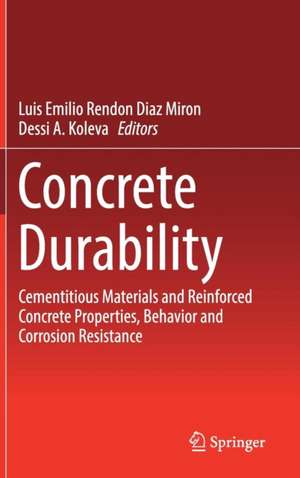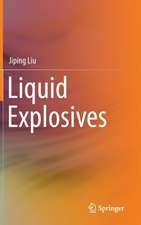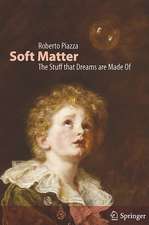Concrete Durability: Cementitious Materials and Reinforced Concrete Properties, Behavior and Corrosion Resistance
Editat de Luis Emilio Rendon Diaz Miron, Dessi A. Kolevaen Limba Engleză Hardback – 5 mai 2017
| Toate formatele și edițiile | Preț | Express |
|---|---|---|
| Paperback (1) | 577.87 lei 6-8 săpt. | |
| Springer International Publishing – 11 sep 2018 | 577.87 lei 6-8 săpt. | |
| Hardback (1) | 781.15 lei 6-8 săpt. | |
| Springer International Publishing – 5 mai 2017 | 781.15 lei 6-8 săpt. |
Preț: 781.15 lei
Preț vechi: 952.61 lei
-18% Nou
Puncte Express: 1172
Preț estimativ în valută:
149.47€ • 156.48$ • 123.68£
149.47€ • 156.48$ • 123.68£
Carte tipărită la comandă
Livrare economică 05-19 aprilie
Preluare comenzi: 021 569.72.76
Specificații
ISBN-13: 9783319554617
ISBN-10: 3319554611
Pagini: 162
Ilustrații: VIII, 162 p. 64 illus., 43 illus. in color.
Dimensiuni: 155 x 235 mm
Greutate: 0.42 kg
Ediția:1st ed. 2017
Editura: Springer International Publishing
Colecția Springer
Locul publicării:Cham, Switzerland
ISBN-10: 3319554611
Pagini: 162
Ilustrații: VIII, 162 p. 64 illus., 43 illus. in color.
Dimensiuni: 155 x 235 mm
Greutate: 0.42 kg
Ediția:1st ed. 2017
Editura: Springer International Publishing
Colecția Springer
Locul publicării:Cham, Switzerland
Cuprins
The Effect of Microorganisms on Concrete Weathering.- Influence of Sulfur Ions on Concrete Resistance to Microbiologically-Induced Concrete Corrosion.- The Onset of Chloride-Induced Corrosion in Reinforced Cement-Based Materials as Verified by Embeddable Chloride Sensors.- The Influence of Stray Current Flow on the Maturity Level of Cement-Based Materials.- Electrochemical Tests in Reinforced Mortar Undergoing Stray Current-Induced Corrosion.- The Effect of Nitrogen-Doped Mesoporous Carbon Spheres (NMCSs) on the Electrochemical Behaviour of Carbon Steel in Simulated Concrete Pore Water.- Activated Hybrid Cementitious System Using Portland Cement and Fly Ash with NA2SO4.- Optimum Green Concrete Using Different High Volume Fly Ash Activated Systems.
Notă biografică
Dr. Luis Emilio Rendon Diaz Miron is a doctorate (PhD) in Materials Science from the University of Texas at Austin in 1977. A professor at the (UNINTER) Universidad Internacional de Cuernavaca, Mexico, is also a participant member of the "Mexican Center for Innovation in Ocean Energies" (CEMIE-Ocean). Dr. Rendon Diaz Miron is a chemical engineer from the National Autonomous University of Mexico (UNAM), a member of the Mexican Academy of Sciences, a member of the New York Academy of Sciences, and a member of the American Crystallographic Association. In collaboration with CEMEX he has developed several concrete compositions resistant to biodeterioration and weathering and organized several cement and concrete symposia inside the International Materials Research Congress (IMRC), organized jointly by the USA Materials Research Society and the Mexican Materials Research Society held every year in Cancun, Mexico.
Dr. D.A. Koleva (female), assistant professor at Delft University of Technology, The Netherlands, Faculty of Civil Engineering and Geosciences, Department Materials and Environment. Visiting professor at Curtin University of Technology, Perth, WA. She is a chemical engineer with a PhD from TU Delft in 2007, MSc in electrochemical engineering, expert in the field of electrochemistry and corrosion, cathodic protection with emphasis on reinforced concrete structures. Dessi Koleva has performed a pioneering research on simultaneously evaluating electrochemical phenomena and cement based microstructural properties, related to corrosion and corrosion control in reinforced concrete. More recently this cross-border research involves the application of tailor-made nano-materials for corrosion control. Her expertise is in the fields of: Electrochemistry; Corrosion and Cathodic protection; Concrete & reinforced concrete durability; Nano-composite (galvanic) coatings; Nano-materials and self-healing in reinforced concrete structures.
Textul de pe ultima copertă
This book describes the newest developments in the creation of concrete using smart additives and supplementary cementitious materials as well as methods, technology and novel admixtures to monitor, evaluate and control steel corrosion in reinforced concrete. Industry experts and research specialists explain the structural, physical, and chemical properties of various types of concrete and its applications. They detail the characteristics preferred for manufacturing specific types of concrete. The book chapters also focus on the electrochemical state of the steel reinforcement in view of steel corrosion and corrosion control. The book encompasses main aspects as follows:
- Characterizes supplementary cementitious materials used for making concrete;
- Details the properties of concrete and the components, essential for concrete manufacturing including Portland cement, calcium sulfate, fly ash, and cupola slag;
- Explains the necessary treatments for the preparation of concrete during the manufacturing process.
- Describes the major durability-related challenge for reinforced concrete structures i.e. chloride-induced steel corrosion, in view of sensors and sensor technology for early corrosion detection.
- Defines stray-current induced corrosion and the consequences for both steel and concrete bulk matrix.
- Illustrates the potential of hybrid nano-materials to affect both steel and concrete, targeting corrosion control and superior performance of reinforced concrete structures.
- Targets dissemination of fundamentally substantiated mechanisms and verification of innovative applications, in view of bringing confidence for industrial utilization of novel solutions or practices in civil engineering.
Caracteristici
nano-materials to affect both steel and concrete, targeting corrosion control and superior performance of reinforced concrete structures Targets dissemination of fundamentally substantiated mechanisms and verification of innovative applications, in view of bringing confidence for industrial utilization of novel solutions or practices in civil engineering Characterizes supplementary cementitious materials used for making concrete Details the properties of concrete and the components, essential for concrete manufacturing including Portland cement, calcium sulfate, fly ash, and cupola slag Explains the necessary treatments for the preparation of concrete during the manufacturing process Describes the major durability-related challenge for reinforced concrete structures i.e. chloride-induced steel corrosion, in view of sensors and sensor technology for early corrosion detection Defines stray-current induced corrosion and the consequences for both steel and concrete bulk matrix Illustrates the potential of hybrid Includes supplementary material: sn.pub/extras








